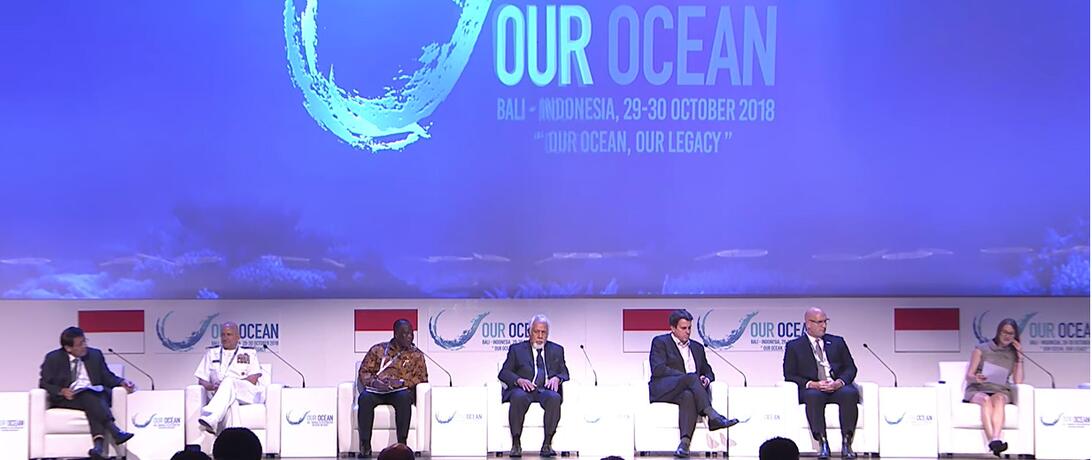
Dr. Sarah Glaser spoke on maritime security at the 2018 Our Ocean Conference in Bali.
On October 29–30, the government of the Republic of Indonesia hosted the fifth Our Ocean Conference in Bali. This year’s theme, “Our Ocean, Our Legacy,” embodied the desire of delegates to drive political will in taking actions to preserve the ocean’s health. Maritime Security, one of six pillars of the conference, drew attention to the problems of illegal fishing, trafficking in arms and drugs by sea, human slavery on fishing vessels, and the links between poor maritime governance and insecurity. Dr. Sarah Glaser, associate director of Secure Fisheries, represented One Earth Future as a speaker during the Maritime Security plenary. She joined Rear Admiral Bob Sharp of the National Maritime Intelligence Integration Office (NMIO); H.E. Mohammad Habibu Tijani, deputy minister of foreign affairs of Ghana; H.E. Kay Rala Xanana-Gusmão, chief negotiator at the Council for the Final Delimitation of Maritime Boundaries, East Timor; and Tony Long, CEO of Global Fishing Watch. Dr. Glaser spoke about the connections between maritime security and human security. “The Maritime Security pillar recognizes explicitly what we all know intuitively: the blue economy, sustainable fisheries, ocean health, climate—they are intrinsically linked to human well-being,” she said. Additionally, Glaser stressed the growing threat of fisheries conflict and promoted a new report by Secure Fisheries showing that fisheries conflicts in Tanzania have grown significantly in the past three decades and that small fisheries conflicts can exacerbate food insecurity and political instability.
This was the second year that maritime security was part of the Our Ocean Conference, and the topic drew considerable interest from delegates. NMIO, Global Fishing Watch, the Aspen High Seas Institute, the Waitt Institute, and Pew all hosted or co-hosted side events focused on illegal, unreported, and unregulated fishing and maritime security that were well developed and well attended. As the international community increasingly recognizes the connections between ocean health and human security, there are several actions that could improve maritime security around the world:
- We can share resources and intelligence about dynamic and mobile illicit maritime activity.
- We can insist our governments join the 56 other nations around the world that have ratified the UN Port State Measures Agreement so there is no safe harbor for illicit goods.
- We must promote gender equality by supporting women’s economic empowerment and by including them in policies designed to reduce criminal activity.
- We must recognize that while a significant amount of maritime insecurity occurs in the waters of developing nations and large ocean nations, most of the demand for illicit trade is driven by developed and even non-coastal nations. It is, therefore, a global responsibility to fight the forces that promote slavery on board fishing vessels or trafficking in endangered wildlife.